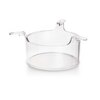Vascular endothelial cell growth factor (VEGF) produced by A-431 human epidermoid carcinoma cells and identification of VEGF membrane binding sites.
Myoken, Y, et al.
Proc. Natl. Acad. Sci. U.S.A., 88: 5819-23 (1991)
1991
Show Abstract
A distinct family of endothelial cell mitogens that are homologous to platelet-derived growth factor has recently been identified. Unlike other known endothelial cell mitogens, these vascular endothelial cell growth factors (VEGFs) are secreted and appear to act specifically on endothelial cells. We have purified VEGF 2083-fold to apparent homogeneity from protein-free culture medium conditioned by A-431 human epidermoid carcinoma cells. This A-431-derived VEGF was characterized as a homodimer composed of 22-kDa subunits with an N-terminal sequence that was similar to VEGFs produced by human HL-60 leukemic and U-937 histiocytic lymphoma cells. A-431 VEGF was used to identify specific and saturable binding sites for VEGF on human umbilical vein endothelial cells (HUVEC). By affinity cross-linking, VEGF-binding site complexes of 230, 170, and 125 kDa were detected on HUVEC. VEGF specifically induced the tyrosine phosphorylation of a 190-kDa polypeptide, which was similar in mass to the largest binding site detected by affinity cross-linking. | | 1712106
 |













